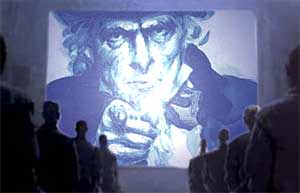America Is Watching You
The "Last Days of Democracy" author warns that Congress is about to aid the Bush administration with its Orwellian plans by granting retroactive immunity to the telecommunications giants for helping the government spy on Americans.
The Senate Intelligence Committee has recently agreed to give the Bush administration what it wants: full retroactive immunity for the telecom companies against civil suits for helping the government eavesdrop without warrant on the phone and e-mail conversations of customers.
According to the Washington Post, the draft Senate bill “will include full immunity for those companies that can demonstrate to a court that they acted pursuant to a legal directive in helping the government with surveillance in the United States. … Such a demonstration, which the bill says could be made in secret, would wipe out a series of pending lawsuits alleging violations of privacy rights by telecommunications companies that provided telephone records, summaries of e-mail traffic and other information to the government after Sept. 11, 2001, without receiving court warrants” (emphasis added). The devil, however, is in the details, and, unfortunately, the Post has not disclosed the nature of such “other information.”
At least 40 of the lawsuits to which the Post is referring are against AT&T for its alleged role in helping the National Security Agency parse through millions of phone and e-mail messages passing through rooms hidden deep inside major AT&T hubs in the United States.
This NSA/AT&T program was exposed in 2005 when Mark Klein, an AT&T employee at the San Francisco hub, blew the whistle. Klein produced photographs and other documents to show that AT&T kept a secret room requiring NSA clearance.
Eventually, other whistle-blowers came forth to report similar secret rooms at other AT&T hubs in other U.S. cities, including St. Louis, Seattle, Atlanta and Los Angeles. On behalf of the customers of AT&T, the Electronic Frontier Foundation (EFF) filed a class-action suit against the company for its collaboration with the NSA in what the EFF considers illegal “dragnet surveillance.”
The EFF maintains that AT&T installed a fiber-optic splitter at its San Francisco office that copies all e-mails and other Internet traffic and provides these copies to the NSA, including both domestic and international Internet activities of AT&T WorldNet customers.
This clearly involves more than a telecom company’s cooperation in turning over standard telephone records and summaries of e-mail traffic to the government. Rather, its primary purpose is to look for suspicious message content — presumably that which suggests a terrorist plot. This requires the use of natural language-parsing technology, a form of artificial intelligence that in part looks for predefined words and word relations.
According to the EFF, the secret rooms created under the supervision of the NSA contain “powerful computer equipment connected to separate networks. This equipment is designed to analyze communications at high speed, and can be programmed to review and select out the contents and traffic patterns of communications according to user-defined rules” (emphasis added).
In the absence of judicial oversight, there is no way of knowing what the system’s predefined definitions are.
Therefore, it is not possible to discern who else the government may be targeting with neither warrant nor probable cause — perhaps lawbreakers such as drug traffickers, Internet predators and money launderers; but targets might just as well include investigative journalists, political opponents and other persons deemed hostile to the Bush administration.
It is also difficult or impossible to tell, without judicial oversight, how the Bush administration might use this information. For example, it could expand an “enemies list” or brand dissidents as “unlawful enemy combatants” according to the vague and potentially dangerous definition provided in the Military Commissions Act passed by Congress in 2006.
It’s clear why a grant of legal immunity to the telecoms to secretly conduct surveillance for the government is a high priority for the Bush administration. With the judicial branch out of the loop, the administration will have a blank check to pursue “Total Information Awareness,” the name earlier given to an Orwellian mass surveillance project that was defunded by Congress in 2003 amid a public outcry. The purported purpose of that project was to “imagine, develop, apply, integrate, demonstrate and transition information technologies, components and prototype, closed-loop, information systems that will counter asymmetric threats by achieving total information awareness.”
Now the legal seeds may finally be sown for a major component of such an integrated system. There would be immunized cooperation of the telecoms, copies of all electronic communications of virtually all Americans in a federal computer network, and the potential for straining out the content of messages that “look suspicious,” according to secret predefined definitions, for secret purposes carried on without judicial oversight. And all this, of course, propagated on the vague pretext that surveillance is “directed at [persons] reasonably believed to be located outside of the United States” (Protect America Act of 2007).Add to this that the parsing technology being used to secretly gather information is notoriously unreliable and can turn up false positives linking innocent Americans with crimes, terrorism and other “forbidden” activities. With the disbanding of Fourth Amendment protections against search and seizure without court warrants or probable cause, no Americans, not even those who are apolitical and believe they have nothing to hide, are safe. Under this judicially unregulated Orwellian system of total information awareness, all Americans who use the Internet and/or the telephone (which means virtually all Americans) are suspects in a massive, nationwide (and global) government dragnet.
The Washington Post has reported that granting retroactive immunity to the telecoms will have the effect of “wiping out” pending lawsuits against AT&T. This, however, is an oversimplification because not even Congress has the power to immunize anyone against being held accountable for the violation of another’s constitutional rights.
According to Lee Tien, attorney for the EFF, “When you’ve got pending lawsuits and suddenly pull the rug out from under them … that’s a major attack on the role of the judiciary.”
If the bill becomes law, Tien said, plaintiffs’ attorneys will argue that the grant of retroactive immunity violates the separation of powers and involves an attempt to legitimize the violation of the plaintiffs’ Fourth Amendment right to privacy. In that case, Congress will have acted to provide a major impediment to the survival of a free America in a monumental battle to be waged in the courtroom — and quite possibly the Supreme Court.
Congress should therefore act responsibly in the first place by unequivocally refusing to grant retroactive immunity to the telecoms. For it to do otherwise is a breach of trust with the American people and a precedent fraught with peril.
Elliot D. Cohen, Ph.D., is a media ethicist and critic. His most recent book is “The Last Days of Democracy: How Big Media and Power-Hungry Government Are Turning America Into a Dictatorship.” He is a first-prize winner of the 2007 Project Censored Award.
Your support matters…Independent journalism is under threat and overshadowed by heavily funded mainstream media.
You can help level the playing field. Become a member.
Your tax-deductible contribution keeps us digging beneath the headlines to give you thought-provoking, investigative reporting and analysis that unearths what's really happening- without compromise.
Give today to support our courageous, independent journalists.






You need to be a supporter to comment.
There are currently no responses to this article.
Be the first to respond.